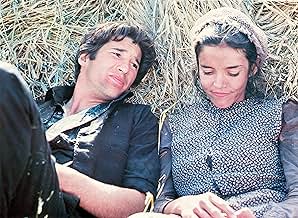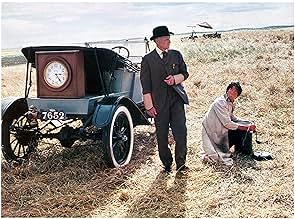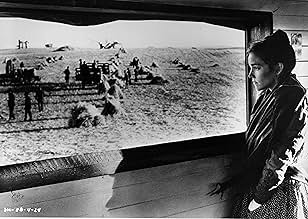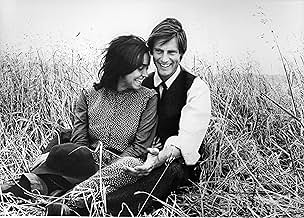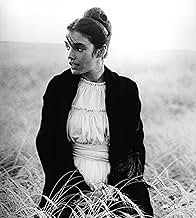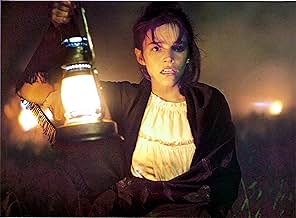Un trabajador del campo convence a la mujer que ama de que se case con su jefe, moribundo y rico, para hacerse con su fortuna.Un trabajador del campo convence a la mujer que ama de que se case con su jefe, moribundo y rico, para hacerse con su fortuna.Un trabajador del campo convence a la mujer que ama de que se case con su jefe, moribundo y rico, para hacerse con su fortuna.
- Dirección
- Guionista
- Elenco
- Ganó 1 premio Óscar
- 13 premios ganados y 13 nominaciones en total
Robert J. Wilke
- The Farm Foreman
- (as Robert Wilke)
Timothy Scott
- Harvest Hand
- (as Tim Scott)
Terrence Malick
- Mill Worker
- (sin créditos)
- Dirección
- Guionista
- Todo el elenco y el equipo
- Producción, taquilla y más en IMDbPro
Opiniones destacadas
"Days of Heaven" is a beautiful film with fantastic panoramic cinematography. It's hard to say what it is about this film that captivated me from the start. I didn't expect to enjoy it when I read about the plot. Farm workers? How could that be interesting... But oh, the haunting, heavenly silence of the fields undulating in the wind, a silence not sundered by any garish music. Everything about this film is tangible, real, alive. The dialogue is sparse, believable, the bond between Bill and Abby is one of quiet passion that needs no dramatic proclamations to fuel it. And Sam Shepard's farmer is touching. I don't use that word very often, but I'll venture it here. I have watched this film now several times, and it is a delight each time when the farmer first sees Abby. This perhaps the strongest and most believable love triangle ever put to film, and in my opinion, the most compelling.
This is gorgeous looking film very much filmed at dusk and dawn. A film misunderstood upon its time of release and only after Terrence Malick's subsequent films can you now understand what the writer- director was aiming at.
The fact that Malick's next film emerged 20 years later we understand this is a person who wants to tell his story by visuals. Actors talking is just secondary and those scenes end up on the cutting room floor.
Days of Heaven which was shot in 70mm always had a reputation for its Cinematography which won an Oscar.
Now we can marvel at it in our homes on widescreen high definition television. You can really have those close ups of those insects. It is also a surprisingly short film, coming in at just over 90 minutes.
The tale is slight, Gere is a hothead with a girlfriend that is pretending to be his sister and his actual younger sister. They get a job whilst fleeing from Chicago in a farm in Texas where the Farmer played by Sam Shepard takes a shine to the girlfriend and marries her. Gere is aware that the Framer only has a year to live.
Apparently the film took several years to be edited and the narration from the youngest sister had to be added to make the story flow. A similar device was used by Malick in 'The Thin Red Line.'
The film might be seen as slow and maybe hard to fathom because there is relative little dialogue but as mentioned you admire the visuals and at 90 minutes it is not as slow moving as you think.
A brave beautifully crafted film.
The fact that Malick's next film emerged 20 years later we understand this is a person who wants to tell his story by visuals. Actors talking is just secondary and those scenes end up on the cutting room floor.
Days of Heaven which was shot in 70mm always had a reputation for its Cinematography which won an Oscar.
Now we can marvel at it in our homes on widescreen high definition television. You can really have those close ups of those insects. It is also a surprisingly short film, coming in at just over 90 minutes.
The tale is slight, Gere is a hothead with a girlfriend that is pretending to be his sister and his actual younger sister. They get a job whilst fleeing from Chicago in a farm in Texas where the Farmer played by Sam Shepard takes a shine to the girlfriend and marries her. Gere is aware that the Framer only has a year to live.
Apparently the film took several years to be edited and the narration from the youngest sister had to be added to make the story flow. A similar device was used by Malick in 'The Thin Red Line.'
The film might be seen as slow and maybe hard to fathom because there is relative little dialogue but as mentioned you admire the visuals and at 90 minutes it is not as slow moving as you think.
A brave beautifully crafted film.
I can understand why Malick didn't make another movie after he made Days of Heaven. The film was panned by the majority of the critics who could only find the cinematography worthy of praise. However, Malick was hugely misunderstood by these dumb critics.
They complain that the film is ponderously slow. This was the intention. Malick used pause to convey that the characters think. Too many actors rattle off their lines without letting their characters think of them. It also conveys the slow pace of their lives.
Critics complain that the characters are too remote - one feels removed from them and can't get involved. Hello! It is narrated by a 13 yr old and is essentially her view of the events that transpired. Naturally she does not grasp most of the more adult moments between them and thus is herself removed from being fully involved in Bill and Abby's relationship and that is what has to come across.
Then Malick, in a moment of genius, allied the four main characters to the four elements; Earth, Air, Fire & Water. Bill is Fire - he is seen at first in front of the furnaces of a foundry where he works. We can see his temper is volatile. Abby is water - in the very first shot she is scavenging(?) by a stream and she is seen against the backdrop of the river. Linda is Earth - In her narration she says that she is close to the "Oith". The Farmer is Air - constantly tinkering with his weather vane, and his fields of wheat are often seen waving in the wind.
All in all a severely mies-judged film and the critics owe Malick a huge apology. The work is pure genius!
They complain that the film is ponderously slow. This was the intention. Malick used pause to convey that the characters think. Too many actors rattle off their lines without letting their characters think of them. It also conveys the slow pace of their lives.
Critics complain that the characters are too remote - one feels removed from them and can't get involved. Hello! It is narrated by a 13 yr old and is essentially her view of the events that transpired. Naturally she does not grasp most of the more adult moments between them and thus is herself removed from being fully involved in Bill and Abby's relationship and that is what has to come across.
Then Malick, in a moment of genius, allied the four main characters to the four elements; Earth, Air, Fire & Water. Bill is Fire - he is seen at first in front of the furnaces of a foundry where he works. We can see his temper is volatile. Abby is water - in the very first shot she is scavenging(?) by a stream and she is seen against the backdrop of the river. Linda is Earth - In her narration she says that she is close to the "Oith". The Farmer is Air - constantly tinkering with his weather vane, and his fields of wheat are often seen waving in the wind.
All in all a severely mies-judged film and the critics owe Malick a huge apology. The work is pure genius!
10katsat
If any movie could be called filmed poetry, this would be it. From its first opening shot to its last frame, there is such lyricism and emotion and beauty that it almost leaves you speechless. I have not seen this movie in years, but it still affects me and I want to write about it. There is a pervading sadness to the movie, like a memory of something wonderful that could have been, that should have been, that almost was, and is all the more tragic because it was in your hands but slipped through your fingers. This is not a movie for everyone, but if you believe that film can be one of the highest forms of art, this is the film to see.
Days of heaven is exactly what this is. The magic hour (when much of the film was shot), those moments before dawn and after dusk when everything is indirect, dreamlike, breathless, heartwaking. There's no real story, as such. Sure, there's a general plot line which should satisfy any casual viewer. This isn't, after all, a hard film to follow. It is simply that the environment is the main character as opposed to the human elements. Linda Manz's young character narrates the story sporadically, like a sleepy traveler beside the campfire telling you of half-forgotten memories, and wonderful, casual observations that will seem clearer in the morning light, but no longer worth mentioning. Her voice is halting and uncertain, belying a personality that is confident in all other respects. Other actors, good (Brooke Adams, Sam Shepard) and not-so-good (Richard Gere) blend in perfectly. Their performances are so understated that you forget they are actors playing characters. Even Richard Gere, who never learned subtlety and would never again employ it, is almost invisible here.
This is not a long film. For all its leisurely pace, ninety-six minutes is all it needs to tell its tale. Terrence Malick is out for sight and sound. There is nothing lost to unneeded expression, nothing not shared in the space in front of you. That leaves cinematographer Néstor Almendros with the freedom to photograph, to observe without opinion whatever seems to be happening most openly before him.
When I first finished watching "Days of Heaven" it felt like waking from a dream. I couldn't be sure how much time has passed. It seemed so long, but the silence was the same, and little had changed outside my window. Nothing but the heavy quiet was all around me, and I felt the desperate desire to move. Everything beneath my feet felt moving, quietly slipping past and all I had to do was put soles to earth and start walking. This is a film of photographs, images of the purest sort. Open your eyes.
This is not a long film. For all its leisurely pace, ninety-six minutes is all it needs to tell its tale. Terrence Malick is out for sight and sound. There is nothing lost to unneeded expression, nothing not shared in the space in front of you. That leaves cinematographer Néstor Almendros with the freedom to photograph, to observe without opinion whatever seems to be happening most openly before him.
When I first finished watching "Days of Heaven" it felt like waking from a dream. I couldn't be sure how much time has passed. It seemed so long, but the silence was the same, and little had changed outside my window. Nothing but the heavy quiet was all around me, and I felt the desperate desire to move. Everything beneath my feet felt moving, quietly slipping past and all I had to do was put soles to earth and start walking. This is a film of photographs, images of the purest sort. Open your eyes.
¿Sabías que…?
- TriviaThe shot of locusts ascending to the sky was shot in reverse with the helicopter crew throwing peanut shells down, and actors walking backwards.
- ErroresTowards the end of the movie, Bill fires three shots from a double-barreled shotgun without reloading.
- Bandas sonorasEnderlin
Written and Performed by Leo Kottke
Used by permission of Overdrive Music A.S.C.A.P. Copyright 1978
Selecciones populares
Inicia sesión para calificar y agrega a la lista de videos para obtener recomendaciones personalizadas
- How long is Days of Heaven?Con tecnología de Alexa
Detalles
- Fecha de lanzamiento
- País de origen
- Idiomas
- También se conoce como
- Days of Heaven
- Locaciones de filmación
- Lethbridge, Alberta, Canadá(Lethbridge Viaduct High Level Railroad Bridge)
- Productora
- Ver más créditos de la compañía en IMDbPro
Taquilla
- Presupuesto
- USD 3,000,000 (estimado)
- Total en EE. UU. y Canadá
- USD 3,446,749
- Total a nivel mundial
- USD 3,492,909
- Tiempo de ejecución1 hora 34 minutos
- Color
- Relación de aspecto
- 1.85 : 1
Contribuir a esta página
Sugiere una edición o agrega el contenido que falta




